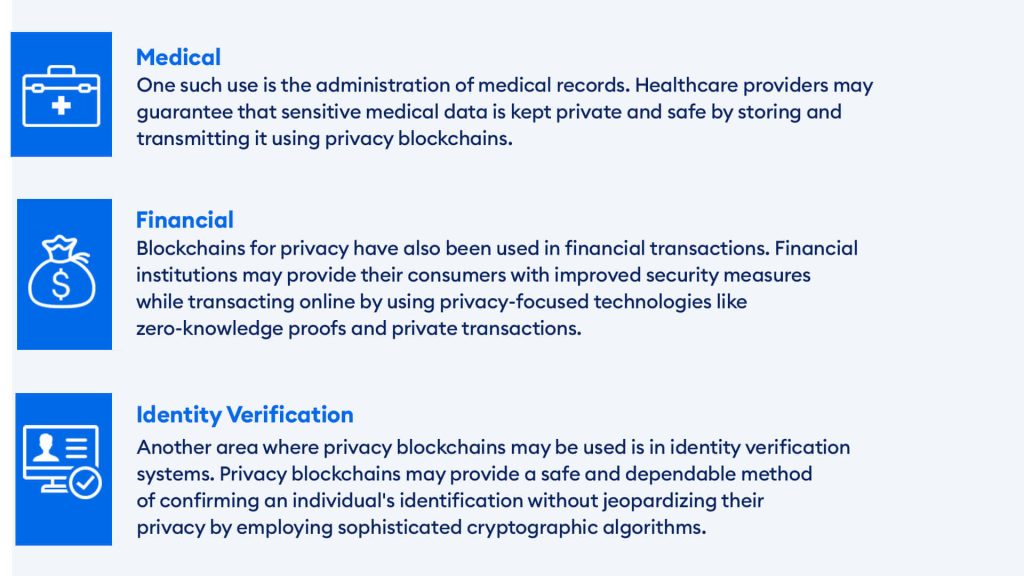Table of Contents
- Understanding Privacy Blockchains and Their Role in Data Security
- Why Privacy Matters: Exploring the Risks of Traditional Data Storage Methods
- How Privacy Blockchains Ensure Confidentiality
- Real-World Applications
- The Benefits and Advantages of Embracing Privacy Blockchains for Businesses and Individuals
- Challenges and Limitations: Addressing the Concerns Surrounding Privacy Blockchains
- Selecting the Right Privacy Blockchain Solution
Understanding Privacy Blockchains and Their Role in Data Security
Data security is a top issue for both individuals and corporations in the modern digital era. Privacy Blockchains, or privacy-focused blockchains, are one new technology that could be considered a possible solution to this problem. 1
Blockchains for privacy are decentralized networks that protect the integrity and secrecy of data using cutting-edge cryptographic methods. Privacy Blockchains are intended to be intrinsically safe and impervious to manipulation, in contrast to conventional data storage techniques that depend on centralized servers and are susceptible to data breaches and other security risks.2 Privacy blockchains provide a potent tool for protecting sensitive information in the digital age by using privacy-focused technologies like zero-knowledge proofs and private transactions.
Examples of privacy-focused blockchains include Monero, Zcash, and Dash. These networks prioritize the privacy and confidentiality of their users’ transactions, making it difficult to trace the flow of funds or identify the parties involved in a transaction.
Why Privacy Matters: Exploring the Risks of Traditional Data Storage Methods
People are more at risk than ever before of having their privacy invaded due to the growth of big data and the growing usage of personal information by corporations and governments. Traditional ways of storing data, including centralized databases, are inherently open to identity theft, data breaches, and other types of cybercrime. Additionally, people often have little control over how third parties obtain, utilize, and disclose their personal information. 3
Businesses also face considerable risks when it comes to preserving sensitive information, so privacy problems are not only a problem for people. Significant financial losses, reputational harm, and loss of client confidence may all be brought on by data breaches. Additionally, companies that do not sufficiently secure client data risk legal repercussions and regulatory fines.
How Privacy Blockchains Ensure Confidentiality
Privacy blockchains are fundamentally decentralized networks that protect data using cutting-edge encryption methods. Privacy blockchains disperse data among a network of nodes, as opposed to conventional databases, which keep data on a single server. A copy of the blockchain ledger, which holds a record of all network transactions, is kept on file by each node in the network. 4
Privacy blockchains use a range of encryption algorithms and cryptographic methods to guarantee the secrecy of data on the network. Zero-knowledge proofs are one such method that enables one party to demonstrate to another party that they are in possession of certain information without actually disclosing that information. As a result, sensitive data being transferred across the network may be used for private transactions without being compromised.
These blockchains use consensus processes in addition to encryption protocols and cryptographic methods to guarantee the accuracy of data on the network. These technologies enable network nodes to concur on the blockchain ledger’s current status and stop malevolent parties from tampering with the data.
Real-World Applications

The Benefits and Advantages of Embracing Privacy Blockchains for Businesses and Individuals
Adopting privacy blockchains has several advantages and benefits for both organizations and individuals. An important benefit for organizations is increased data openness and integrity. Businesses may guarantee that their information is reliable and impenetrable by adopting decentralized networks for data storage and transmission.
The improvement of security measures is another benefit for firms. Businesses may provide their clients with enhanced security against cyber dangers like data breaches and identity theft by using sophisticated cryptographic methods like zero-knowledge proofs and private transactions.
A major advantage of adopting privacy blockchains for people is having more control over their personal data. Individuals may guarantee the confidentiality and security of their sensitive information by employing decentralized networks to store and transfer data.
By providing a visible and auditable record of how personal data is gathered, used, and shared, privacy blockchains may also assist organizations in adhering to laws like the GDPR.5
Challenges and Limitations: Addressing the Concerns Surrounding Privacy Blockchains
Although privacy blockchains have numerous advantages for protecting data in the digital age, there are also problems and restrictions that need to be resolved. Scalability problems are one of these difficulties. The computing resources needed to run a privacy blockchain network might drastically rise as more people sign up for it.
Interoperability with current systems is another issue. Many companies use antiquated systems that may not work with private blockchain technology. Because of this, organizations may find it challenging to incorporate privacy blockchains into their current infrastructure.6
Despite these difficulties, efforts are being made to allay these worries and enhance the scalability and compatibility of privacy blockchains. By continuing to develop and improve this technology, it is feasible to get around these restrictions and realize the full promise of privacy blockchains for protecting data in the digital age.
Selecting the Right Privacy Blockchain Solution
There are several important factors to consider while choosing the best privacy blockchain solution for your requirements. The standards used to evaluate privacy blockchain technologies are an essential consideration. This covers elements like the extent of security offered, the network’s scalability capabilities, and the simplicity of system integration.
The quantity of resources and assistance the privacy blockchain supplier provides is another crucial factor. This comprises elements like written content, instructional resources, and customer support.
You may choose the best privacy blockchain solution for your needs by carefully assessing your requirements and taking into account these important elements. This will allow you to take advantage of this technology’s numerous advantages and benefits.7
- blog.netwrix.com https://blog.netwrix.com/2021/07/26/data-security/[↩]
- ieeexplore.ieee.org https://ieeexplore.ieee.org/document/7163223[↩]
- nytimes.com https://www.nytimes.com/wirecutter/blog/7-simple-ways-to-protect-your-digital-privacy/[↩]
- dentons.com https://www.dentons.com/en/insights/articles/2022/june/9/the-privacy-paradox-in-blockchain-best-practices-for-data-management-in-crypto[↩]
- ibm.com https://www.ibm.com/topics/benefits-of-blockchain[↩]
- link.springer.com https://link.springer.com/article/10.1007/s10586-021-03260-0[↩]
- blockgeeks.com https://blockgeeks.com/guides/what-is-blockchain-technology/[↩]


